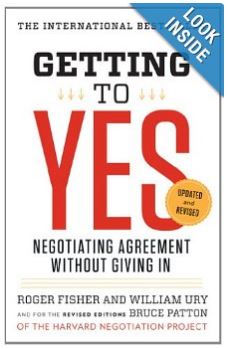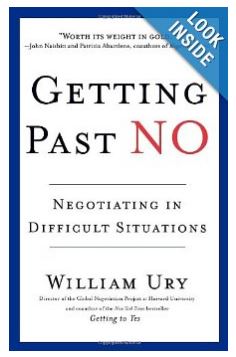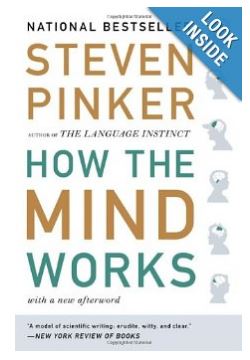| | This week I am interviewing Padraig (Patrick) Moriarty, the President and CEO of Pathfinder Capital. For the past ten years Padraig has worked as a gatherer of assets for hedge funds and private equity firms. Prior to Pathfinder, Padraig was a partner at Caplink Partners and before that, the President and CEO at Lacken Bay Partners. Padraig also had stints at EACM, Julius Baer and at Bear Stearns, where he started his financial career back in the late 1980's. So Padraig, what's in your library? Before we dig into the books that have had an impact on my career, I'd just like to point out that they are more geared towards how to negotiate effectively. We negotiate in all facets of our lives; whether with our children, or with competitors, or with those with whom we seek out a business relationship with. We must negotiate in good faith and seek out "common ground" while being objective and at the same time accomplish the best interests of our firm, people and mission. The books I mention below, all touch upon these issues. |

Getting To Yes: Negotiating Agreement Without Giving In by Roger Fisher & William Ury - The book reviews and provides examples of implementation for the negotiating method "principled negotiation or negotiation of merits". The book leverages findings from "The Harvard Negotiation Project".
The authors found five "key" elements to "Principled Negotiation". These are:
The authors found five "key" elements to "Principled Negotiation". These are:
- To focus on interests, not positions.
- Invent options ofr mutual gain.
- Use objective criteria.
- Separate the people from the problem.
- Use BATNA (Best alternative to negotiated agreement).

Getting Past No: Negotiating In Difficult Situations by William Ury - The author gives a five-step strategy on how to get past no.
- "Going to the balcony"
- "Yes. Whatever language you use, the key is to present your views as an addition to 'or additive' rather than a direct contradiction to your opponent's point of view."
- "Why? Why not? What if?"
- "A proposal that is unacceptable coming from you may be acceptable if it comes from a third party."
- "Instead of using power to bring your opponent to his or her knees, use it to bring him or her to his or her senses."

How The Mind Works by Steven Pinker - This book had an enormous impact on my career early on! The quotes below helped to shape my thinking when I constructed the EACM 100 Hedge Fund Benchmark. The EACM 100 Hedge Fund Benchmark broke down the categories of hedge funds into Relative Value, Event Driven, Equity Hedge Funds, Global Macro and Short Sellers. These categories negate a percentage of the hedge fund universe. Irrespective, the EACM 100 Hedge Fund Benchmark and categories of hedge fund strategies have helped the investor universe understand what to expect from a risk return, correlation and drawdown perspective from a potential investment within a hedge fund category. Individual manager risk, by far the greatest investment risk in the allocation of capital to an individual hedge fund manager, and the determination of a potential allocation of capital require a significant amount of due diligence. Too much diversification at the individual hedge fund manager level negates a certain level of risk but also negates a more productive level of return. With that said, the key quotes that lead me to my innovation, as well as some of my own thoughts, are below.
Whether we are investing through the allocation of capital either by way of proprietary capital or as a fiduciary with client capital, we must understand the other side of our trade and why the competiton has taken a position 'directly opposite' to our own. Many in our field use 'experts' either by way of the 'Wall Street Journal' and or Economic Journals and/or competitor hedge fund manager letters to clients or allowing those 'experts' to be responsible for a part of our decision-making 'apparatus' etc. in order to have our macro views come together. Our micro views of individual trades come similarly from significant work in what can be described to our clients as internal 'experts'.
In the Fifth Chapter of 'Good Ideas' within the book "How the Mind Works", "Experts are invaluable and are usually rewarded in esteem and wealth. But our reliance on experts puts temptation in their path. The experts can allude to a world of wonders--occult forces, angry gods, magical potions--that is inscrutable to mere mortals but reachable through their services. Tribal shamans are flim-flam artists who supplement their considerable practical knowledge with stage magic, drug-induced trances, and other cheap tricks. Like the Wizard of Oz, they have to keep their beseechers from looking at the man behind the curtain, and that conflicts with the disinterested search for the truth."
"In a complex society, a dependence on experts leaves us even more vulnerable to quacks, from carnival snake-oil salesman to the mandarins who advise governments to adopt programs implemented by mandarins. Modern scientific practices peer review, competitive funding, and open mutual criticism are meant to minimize scientists' conflicts of interest in principle and sometimes do so in practice."
Perception vs. Reality. A healthy dose of 'second quessing' so-called experts is paramount to own mutual success together with our clients. Managers of capital as 'experts' who go from 'humility' to 'hubris and ego' beg the gods for a reality check. Stay humble!
Within 'Good Ideas' and "How the Mind Works" "The humorist Robert Benchley said there are two classes of people in the world: those who divide the people of the world into two classes, and those who do not. I took it for granted that the mind forms categories. But the habit of categorizing deserves scrutiny as well. People put things and other people into mental boxes, give each box a name, and thereafter treat the contents of the box the same. But if our fellow humans are as unique as their fingerprints and no two snowflakes are alike, why the urge to classify?"
"Psychology textbooks typically give two explanations, neither of which makes sense. One is that memory cannot hold all the events that bombard our senses; by storing only their categories, we cut down on the load. But the brain, with its trillion synapses, hardly seems short of storage space. People live for a paltry two billion seconds, and there is no known reason why the brain could not record every object and event we experience if it had to. Also, we often remember both a category and its members, such as months, family members, continents, and baseball teams, so the category adds to the memory load."
"The other putative reason is that the brain is compelled to organize; without categories, mental life would be chaos. But organization for its own sake is useless. No, the mind has to get something out of forming categories, and that something is inference. Obviously, we can't know everything about every object. But we can observe some of its properties, assign it to a category, and from the category predict properties that we have not observed. To identify very specific categories we have to examine so many properties that there would be few left to predict. They represent a compromise between how hard it is to identify the category and how much good the category does you. The pyschologist Eleanor Rosch called them basic-level categories. But categories would be useful only if they meshed with the way the world works. Fortunately for us, the world's objects are not evenly sprinkled throughout the rows and columns of the inventory list defined by the properties we notice. The world's inventory is lumpy. Mental boxes work because things come in clusters that fit into boxes."
Thanks Padraig. Great stuff!
As always you can buy any of the books Padraig mentioned at the The Sniper Book Bin. If you'd like to see another great read, sign up for The Sure Shot Letter, my monthly newsletter that is packed full with great investment ideas. Hit the button at the top of the page for a free sample, and/or subscribe here.
Whether we are investing through the allocation of capital either by way of proprietary capital or as a fiduciary with client capital, we must understand the other side of our trade and why the competiton has taken a position 'directly opposite' to our own. Many in our field use 'experts' either by way of the 'Wall Street Journal' and or Economic Journals and/or competitor hedge fund manager letters to clients or allowing those 'experts' to be responsible for a part of our decision-making 'apparatus' etc. in order to have our macro views come together. Our micro views of individual trades come similarly from significant work in what can be described to our clients as internal 'experts'.
In the Fifth Chapter of 'Good Ideas' within the book "How the Mind Works", "Experts are invaluable and are usually rewarded in esteem and wealth. But our reliance on experts puts temptation in their path. The experts can allude to a world of wonders--occult forces, angry gods, magical potions--that is inscrutable to mere mortals but reachable through their services. Tribal shamans are flim-flam artists who supplement their considerable practical knowledge with stage magic, drug-induced trances, and other cheap tricks. Like the Wizard of Oz, they have to keep their beseechers from looking at the man behind the curtain, and that conflicts with the disinterested search for the truth."
"In a complex society, a dependence on experts leaves us even more vulnerable to quacks, from carnival snake-oil salesman to the mandarins who advise governments to adopt programs implemented by mandarins. Modern scientific practices peer review, competitive funding, and open mutual criticism are meant to minimize scientists' conflicts of interest in principle and sometimes do so in practice."
Perception vs. Reality. A healthy dose of 'second quessing' so-called experts is paramount to own mutual success together with our clients. Managers of capital as 'experts' who go from 'humility' to 'hubris and ego' beg the gods for a reality check. Stay humble!
Within 'Good Ideas' and "How the Mind Works" "The humorist Robert Benchley said there are two classes of people in the world: those who divide the people of the world into two classes, and those who do not. I took it for granted that the mind forms categories. But the habit of categorizing deserves scrutiny as well. People put things and other people into mental boxes, give each box a name, and thereafter treat the contents of the box the same. But if our fellow humans are as unique as their fingerprints and no two snowflakes are alike, why the urge to classify?"
"Psychology textbooks typically give two explanations, neither of which makes sense. One is that memory cannot hold all the events that bombard our senses; by storing only their categories, we cut down on the load. But the brain, with its trillion synapses, hardly seems short of storage space. People live for a paltry two billion seconds, and there is no known reason why the brain could not record every object and event we experience if it had to. Also, we often remember both a category and its members, such as months, family members, continents, and baseball teams, so the category adds to the memory load."
"The other putative reason is that the brain is compelled to organize; without categories, mental life would be chaos. But organization for its own sake is useless. No, the mind has to get something out of forming categories, and that something is inference. Obviously, we can't know everything about every object. But we can observe some of its properties, assign it to a category, and from the category predict properties that we have not observed. To identify very specific categories we have to examine so many properties that there would be few left to predict. They represent a compromise between how hard it is to identify the category and how much good the category does you. The pyschologist Eleanor Rosch called them basic-level categories. But categories would be useful only if they meshed with the way the world works. Fortunately for us, the world's objects are not evenly sprinkled throughout the rows and columns of the inventory list defined by the properties we notice. The world's inventory is lumpy. Mental boxes work because things come in clusters that fit into boxes."
Thanks Padraig. Great stuff!
As always you can buy any of the books Padraig mentioned at the The Sniper Book Bin. If you'd like to see another great read, sign up for The Sure Shot Letter, my monthly newsletter that is packed full with great investment ideas. Hit the button at the top of the page for a free sample, and/or subscribe here.
 RSS Feed
RSS Feed
